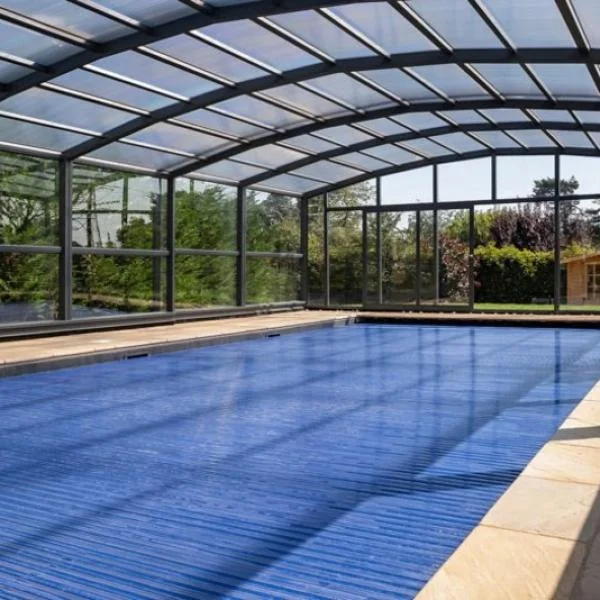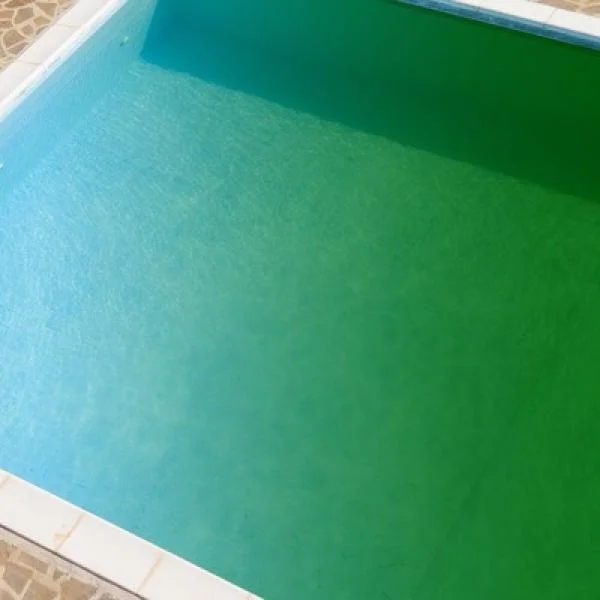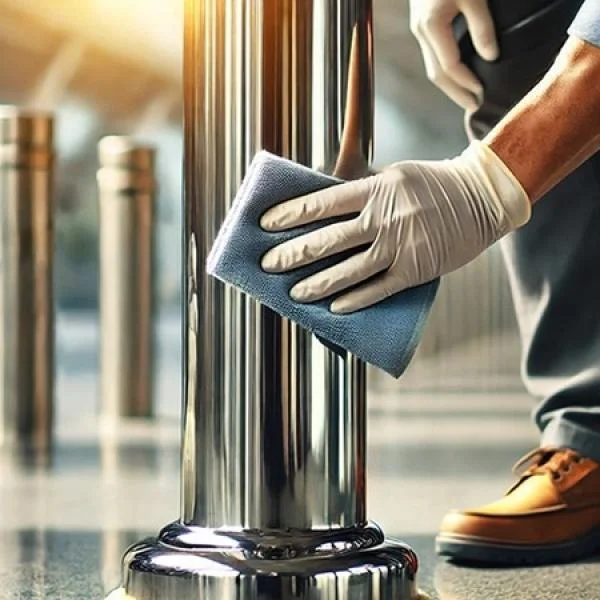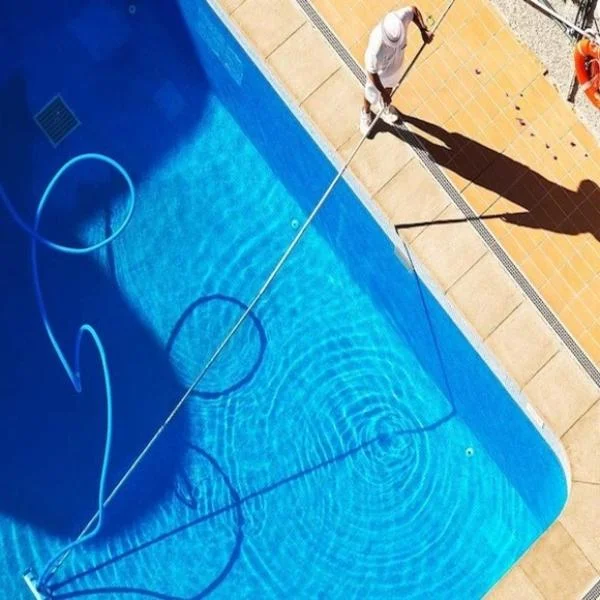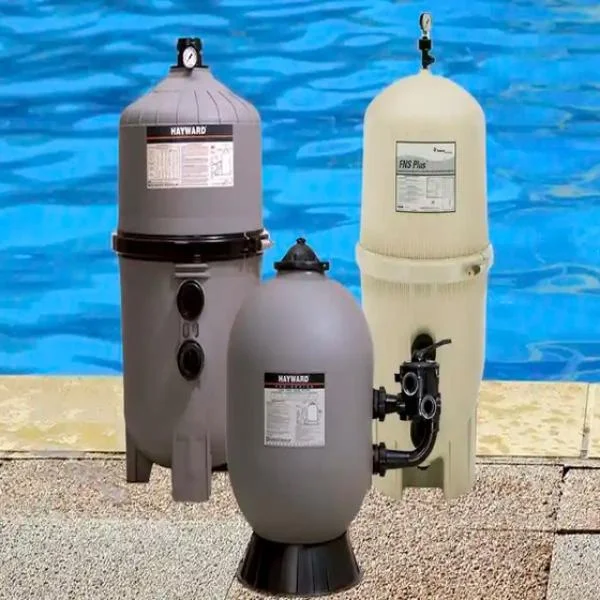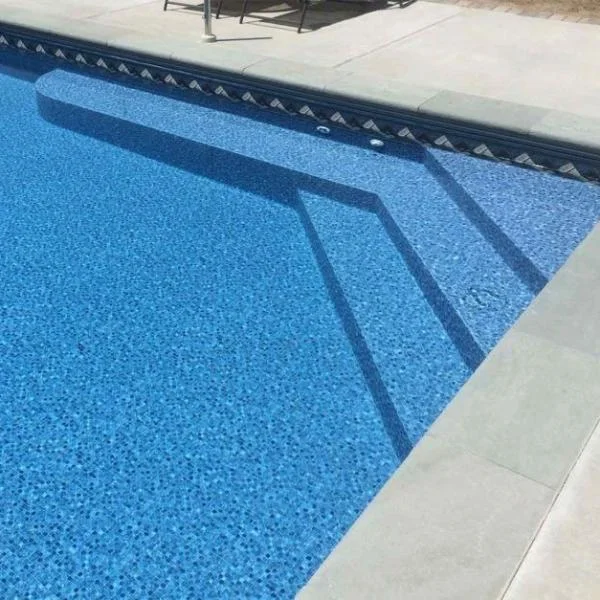
Throughout the swimming season, it can be challenging to maintain the proper temperature in the pool. However, if you want to enjoy your pool for more months of the year, finding efficient ways to heat a swimming pool is essential. Fortunately, there are several options to keep your pool warm and comfortable throughout the year. In this article, we will explore 6 methods to heat a swimming pool and offer tips for maintaining the perfect temperature and the most cost-efficient.
Why Heat a Swimming Pool?
There are various benefits to heating a swimming pool that improve its use and enjoyment.
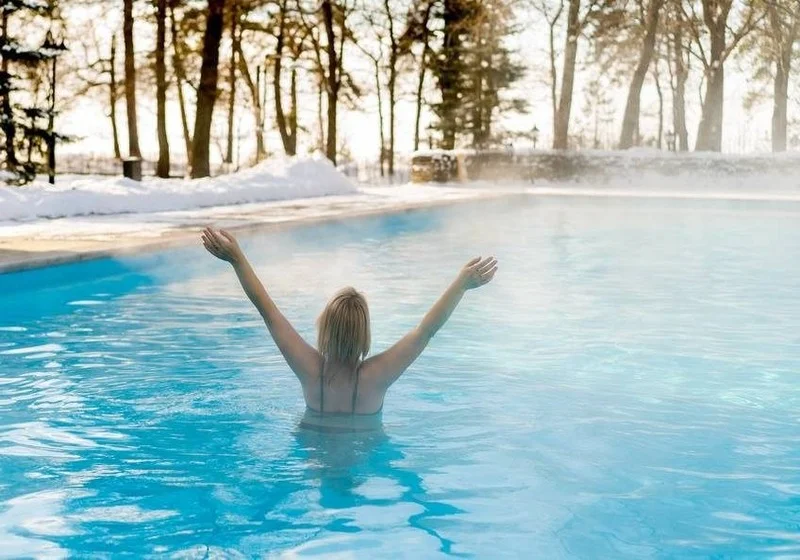
Firstly, it extends the swimming season, allowing you to enjoy your pool even when the outside temperature drops. Whether you live in a colder climate or want to swim during the cool seasons like spring and fall, a heated pool ensures you can maximize your swimming season.
Secondly, heating your pool increases comfort and enjoyment, especially in areas where the temperature drops at night. With a heated pool, you can enjoy a refreshing swim at any time of day, without worrying about the water being too cold.
Lastly, heated pools offer health benefits, particularly for those using the pool for therapeutic purposes. Warm water helps relieve pain, stiffness, and muscle soreness, making it ideal for people recovering from injuries or managing conditions like arthritis.
Overall, heating your pool is an excellent way to maximize its use, comfort, and health benefits year-round.
Methods to Heat a Swimming Pool
Now that we’ve covered why heating a pool is important, here are 6 different methods to heat a swimming pool. Each heating method has advantages and disadvantages depending on your needs, budget, and environmental impact.
Solar Pool Heaters
One of the most eco-friendly and cost-effective ways to heat a swimming pool is by using solar energy. Solar pool heaters work by circulating the pool water through solar panels, where it's heated by the sun and returned to the pool.
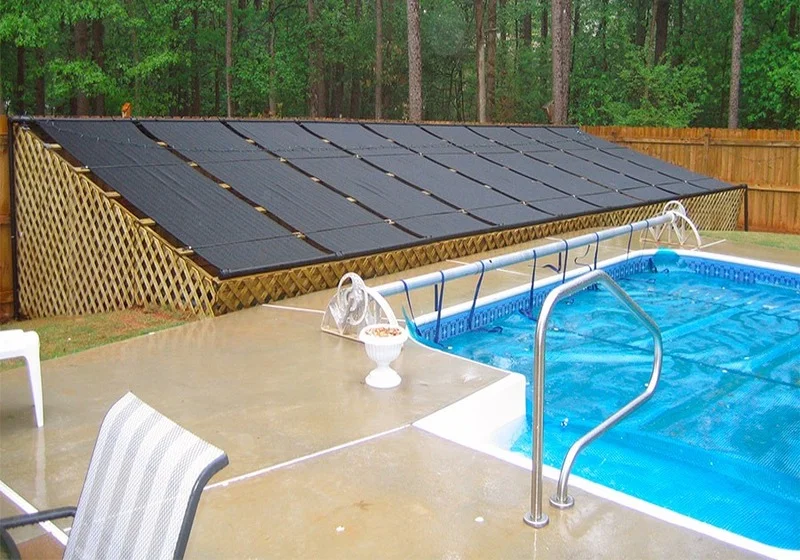
Advantages :
- Eco-friendly, powered by solar energy is renewable.
- Reduced installation-related operating expenses
- Solar covers help conserve water by reducing evaporation, which also helps maintain chemical balance.
Disadvantages:
- Installation fees can be expensive initially.
- Dependent on sunlight availability, making it less effective in cloudy or cooler climates.
- May require large roof space for solar panels.
Heat Pumps
Heat pumps are another energy-efficient option for heating a pool. They take heat from the surrounding air and add it to the water in the pool. Heat pumps do not generate heat directly but rather amplify the heat available in the surrounding air. Heat pumps work best in moderate to warm climates where air temperatures don’t drop too low.
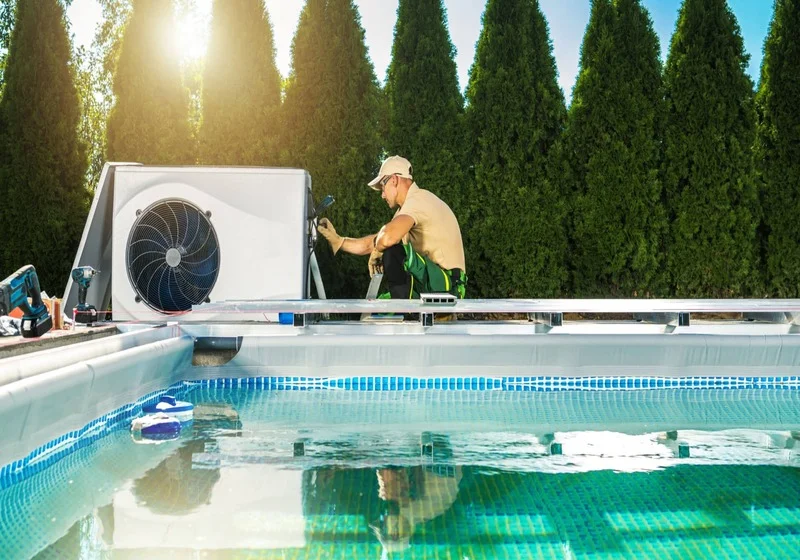
Advantages:
- Highly energy-efficient, with lower running costs compared to gas heaters.
- Long lifespan; with proper maintenance, it can often endure 10 to 15 years.
- Provide steady, reliable heat even when the outside temperature is cooler, though they work best in temperatures above 50°F (10°C).
Disadvantages:
- More expensive upfront than alternative heating solutions.
- Slower heating process, especially in cooler weather.
- In cooler climates, less effective.
Gas Pool Heaters
Gas pool heaters are one of the most popular methods to heat a swimming pool because of their ability to quickly raise water temperature. These heaters use natural gas or propane to heat the pool and are ideal for those who want fast, on-demand heating.
Advantages :
- Heats the pool quickly, making it ideal for occasional use.
- Works in any climate, regardless of the outside temperature.
- You can turn the heater on and off as needed, making it a flexible option for pools that are used sporadically.
Disadvantages :
- Higher operational costs as they require a constant supply of fuel.
- Needs a propane tank or natural gas line.
- Less eco-friendly compared to solar or heat pump options.
Solar Pool Covers (Solar Blankets)
A solar pool cover or blanket is one of the simplest and most affordable ways to heat a pool. While it won't generate heat on its own, a solar blanket traps the sun’s heat and helps retain the warmth in the pool, preventing heat loss through evaporation.
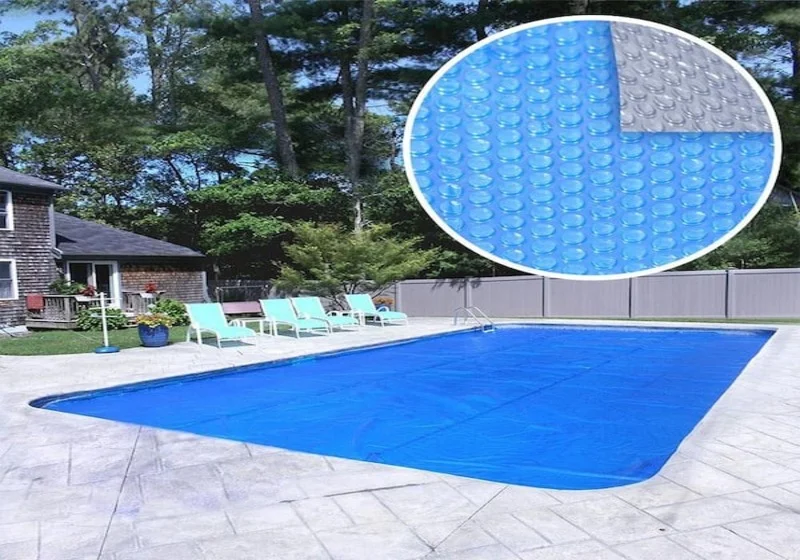
Advantages:
- Very inexpensive compared to other heating options.
- Helps reduce water evaporation, conserving water.
- Can increase efficiency when used with other heating methods.
Disadvantages :
- Heats the pool slowly and relies on sunny days.
- Requires manual covering and uncovering.
- Provides no heat on its own without sunlight.
Pool Heat Exchangers
A pool heat exchanger is another method that can efficiently heat a swimming pool, particularly larger pools. It transfers heat from a separate heating system to the pool water. This heat can come from a variety of sources, including natural gas, propane, or even renewable energy systems like solar or geothermal heating.
Advantages :
- Highly efficient, and can quickly raise the water temperature, making them ideal for large pools or pools used frequently.
- Customizable with various heat sources, allowing for flexible heating solutions.
- In colder climates, make sure the heating is steady and reliable.
Disadvantages:
The efficiency of a pool heat exchanger depends on the external heat source. If paired with a boiler, for example, fuel costs can add up. However, if integrated with a renewable energy system, it becomes an eco-friendly and cost-effective solution.
Electric Pool Heaters
Electric resistance heaters use electricity to heat a coil, which in turn heats the water. While not as popular as gas heaters or heat pumps, electric pool heaters can be useful for smaller pools or hot tubs.
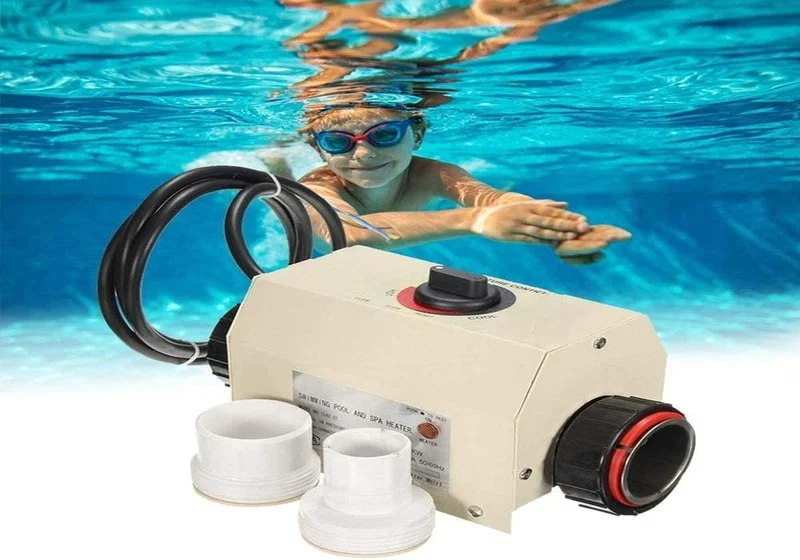
Advantages :
- Fit for smaller pools and simple to install.
- Can be used in any climate.
- Quick heating process.
Disadvantages :
- High running costs as a result of using electricity.
- Less energy-efficient compared to heat pumps or solar heaters.
- Not recommended for large pools.
Some Advice on Effective Pool Heating
Whichever method you choose to heat your swimming pool, you can increase efficiency and save on costs by following these tips:
- Use a pool cover: No matter what heating method you choose, a pool cover is essential for preventing heat loss and reducing water evaporation, especially overnight.
- Regular maintenance: Ensure your heating system operates efficiently by keeping up with regular maintenance, such as cleaning solar panels or checking gas lines for optimal performance.
- Set a timer: For electric or gas heaters, use a timer to heat the pool during specific hours like early morning or late afternoon to reduce energy waste and save on costs.
- Install a windbreak: Wind can cause heat loss from your pool, so consider adding a windbreak, such as a fence, trees, or hedges, to help retain heat.
- Optimize heating based on pool size: Ensure that your heating system is the right size for your pool—this prevents excessive energy use and ensures efficient heating.
Thus, Dong A has shared with readers the most essential knowledge about methods to heat a swimming pool . There are various ways to heat a swimming pool, from eco-friendly solar heaters to fast-working gas heaters. Each option has its benefits, depending on your climate, budget, and pool size. By choosing the right pool heating method, you can enhance your pool experience and reduce maintenance costs.
If you need more references about our water treatment products, please go to the official website of Dong A Chemical at dongachem.com or call a hotline (+84) 985797941 to receive advice and support from the experienced consultant.
Related Articles
The Importance of a Swimming Pool Cover and How to Choose
A swimming pool cover is one of the most essential equipment for your pool. A pool cover plays a ...
Why is My Pool Water Green? Causes and Solutions
Pool water green is not just an eyesore but can also be a sign of potential health hazards. No one ...
How To Clean Stainless Steel with Sodium Hydroxide
Stainless steel is a preferred material for many household items, from kitchen appliances to ...
Essential Pool Maintenance Tips for a Clear Swimming Pool
Pool maintenance is crucial to ensuring its cleanliness, safety, and longevity. Whether you have a ...
When and How to Clean a Pool Filter for Optimal Performance
A clean pool filter is essential for maintaining clear water and working hard to remove dirt, ...
The Best Ways to Clean a Pool Liner and Prevent Stains
A clean pool liner is essential for maintaining a crystal clear and safe swimming pool. Over time, ...

